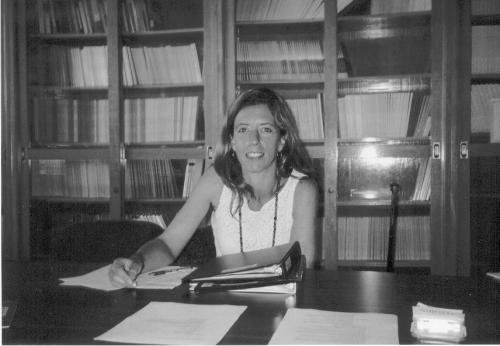Welcome to LS 402: Introduction to Human Rights Education for Teachers and Local Communities!
Dr. Ferreira's Biography
Mariana Kawall Leal Ferreira (Ph.D. UC Berkeley and UC San Francisco, 1996) is a medical anthropologist and mathematics educator from Brazil using Theater and Pedagogy of the Oppressed to protect the human rights of Indigenous Peoples and other minorities in North and South America. Her writings include atlases, cookbooks, scholarly articles, and several teaching manuals and books, such as Acting for Indigenous Rights. Theatre to Change the World (2013) and Mapping Time, Space and the Body. Indigenous knowledge and Mathematical Thinking in Brazil (2015).
Mariana is currently a Professor of Anthropology and Human Rights Education in the School of Humanities and Liberal Studies at San Francisco State University, in California.

Your instructor: Dr. Mariana Leal Ferreira
Student Learning Outcomes
In this class you will learn:
- To become a new generation of human rights educators and learners based on students' interdisciplinary education and real life experiences
- To engage in human rights education by sharing multidisciplinary approaches to stories from different cultures that promote and protect human rights throughout the world.
- To craft narratives that depict one's own, and local community's major ongoing human rights crises.
- To research a contemporary human rights crisis described in the news media and to compare and contrast different interdisciplinary perspectives on it.
- To become familiar with the experiences of human rights scholars and activists as models to determine if people in students' own region, country, or area are undertaking similar or comparable actions.
Introduction to Human Rights Education for Teachers and Local Communities
Introduction to Human Rights Education engages in the evolving field of Human Rights and enhances knowledge, skills, and commitment to a life of freedom and dignity. Students will examine United Nations declarations, treaties, and conventions, such as the Universal Declaration of Human Rights and the Convention on the Rights of the Child. Students will learn to produce hands-on pedagogical materials on human rights that can be incorporated into school curricula and how to spread awareness of peace and freedom into local communities based on students' real-life experiences.
Course Topics
- Interdisciplinary human rights education for future and current teachers and community activists.
- Scope of human rights law since the Charter of the UN in 1948 and the UNDHR in 1949 until the present day.
- Multidisciplinary identification of major HR concepts, theories, and practices in the U.S. and abroad.
- Cross-cultural perspectives of Global Peace acc. to Intl. Relations, Philosophy, Anthropology, Sociology, Peace Studies, and Social Justice.
- Critical reflection on contemporary human rights advocacy to enhance a life of freedom and dignity for all.
Required Books and Reading Assignments
They are all available online .
Most Readings are part of the Human Rights Education Series from the University of Minnesota Human Rights Resource Center
The UMN Human Rights Resource Center is the biggest clearing house for Human Rights education in the US.
From their perspective,
Education in human rights is itself a fundamental human right and also a responsibility: the Preamble of the Universal Declaration of Human Rights (UDHR) exhorts every individual and every organ of society to 'strive by teaching and education to promote respect for these rights and freedoms.' Published by the Human Rights Resource Center at the University of Minnesota in partnership with the Stanley Foundation, the Human Rights Education Series seeks to meet this responsibility by providing resources for the ever-growing body of educators and activists seeking to build a culture of human rights in the United States and throughout the world.
The HR Education Series at UMN is edited by Nancy Flowers (with the following books linked to the appropriate pages)
- (1998) The Human Rights Education Handbook. Effective Practices for Learning, Action, and Change. Topic Book # 4. By Bernbaum, Marcia, Flowers, Nancy, Rudelius Palmer, Kristi, and Tolman, Joel.
- (2015) Towards a Just Society. The Personal Journeys of Human Rights Educators. Human Rights Education Series, Topic Book # 8. Minneapolis, MN: University of Minnesota Human Rights Center. Minneapolis, MN, and Santiago, Chile: UMN Human Rights Resource Center, and Academy of Christian Humanism University. By Magendzo K., Abraham, Claudia Dueños, Nancy Flowers, and Natela Hordan, editors.
- (2013). Acting for Indigenous Rights. Theatre to Change the World. Human Rights Education Series, Topic Book # 7. Minneapolis, MN: University of Minnesota Human Rights Center. By Ferreira, Mariana Leal.
- (2000). Donahue, David M. Lesbian, Gay, Bisexual, and Transgender Rights. A Human Rights Perspective. Topic Book # 3. Human Rights Education Series, Topic Book 3. Minneapolis, MN: University of Minnesota Human Rights Center.
- (2007) Lord, Janet, Katherine Guernsey, Joelle Balfe, and Valerie Karr. Human Rights. YES! Action and Advocacy on the Rights of Persons with Disabilities. Human Rights Education Series, Topic Book # 6. Minneapolis, MN: University of Minnesota Human Rights Center.
Other readings are a part of, or associated with Human Rights Educators USA
The HRE USA Mission is: "To promote human dignity, justice, and peace by cultivating an expansive, vibrant base of support for human rights education (HRE) within the United States."Founded in 2011, Human Rights Educators USA (HRE USA) is a growing network dedicated to building a culture of human rights by providing an innovative forum for HRE practitioners and supporters to learn, network, and exchange professional expertise and better serve our growing HRE community.
6. (2017) Human Rights Education USA. HRE Integration Curriculum Guide. A guide for teachers on how to implement HRE in the classroom.